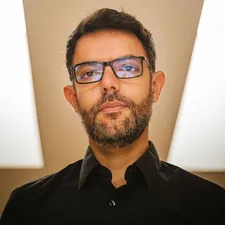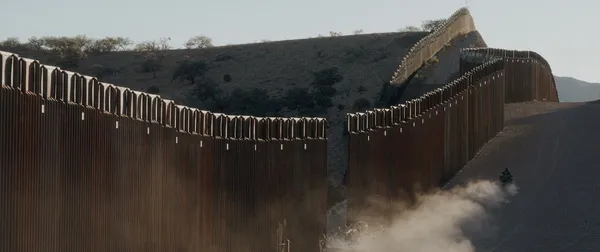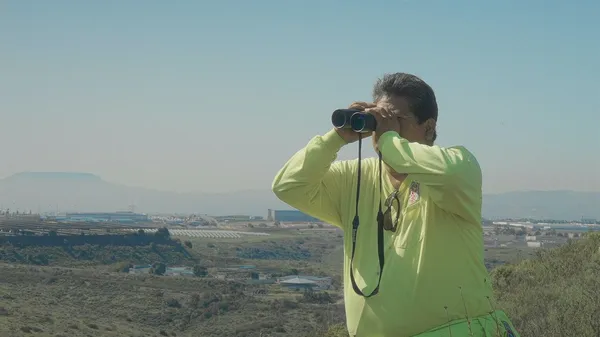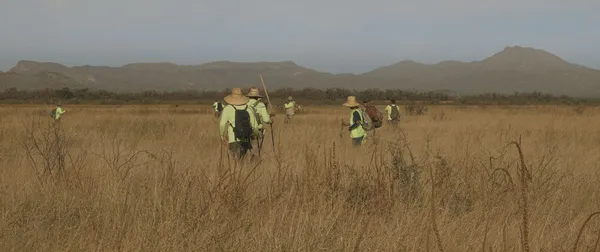In Spare My Bones, Coyote! Lebanese-Canadian director Jonah Malak immerses us in the world of Ely and Marisela Ortiz and their volunteer group Los Aguilas del Desierto, who perform search-and-rescue near the US border and try to give families who have lost loved ones to migration some closure by finding the remains of those who have perished on route. A heartbreaking look at the border crisis, we caught up with Malak after his film screened at Canada’s Hot Docs to talk about the filmmaking process, the craft of the film and his experience of making the movie.
How did you go about building the relationship with Ely and Marisela because they give you intimate access to their house and their everyday lives?
Jonah Malak: There are two key things to be able to manage to build that kind of intimacy. No matter how nice and clear and polite one can be these things need to be given time so that the relationship is established and they understand where I'm coming from, in terms of filmmaking, what the movie will be about, they have a sense and a feel of what's going to be on screen.
 |
| Jonah Malak: |
The second factor is just to immerse ourselves as a team in every situation we can, hoping that this immersion will open the next door without forcing it. So the point of entry was the first search and rescue missions. We showed up, I came from Montreal in Canada to San Diego to meet Ely and Maricela for the first time and they were camera ready. It was like: “If you want to do the interview now we are ready and we can film it tomorrow, as long as you are here.”
I'm like: “No, no, this is not how it works. This is just the beginning of a long process. What I would be interested to do is go out with you in the desert before we start even filming, I'll take my camera just to be able to grab images that might help me communicate with the director of photography and understand the conditions of filming.” There was no intention of filming or of invading the volunteers’ space.
We were so in tune during the busqeada (the search) itself. Full in. I walked their walk, I ran their run, I slept in their hammocks – fully part of the team. That was the turning point in terms of Ely and Marisela accepting the level of commitment that we were willing to put into the filmmaking process.
In terms of your own experience, were you quite shocked by what you saw in terms of the steady flow of phone calls they are receiving every single day?
JM:In peak season, they can receive 40 phone calls a day. It’s their daily mantra. It’s the most omnipresent thing, if I can call it a thing, in their lives. It's to be constantly interrupted by phone calls from people in the desert who are asking for help or their families asking for information about their relatives.
 |
| Jonah Malak: 'The illusion that the desert is silent is as, as wrong as it gets, there's no such thing as silence' Photo: Nicolas Taborga/with the permission of Nemesis Films & h264 |
It’s heartbreaking to see you go to Mexico where you encounter many people who aren’t very well prepared but who are about to try to cross the border.
JM: Yes, the first encounter we had with a living migrant, if I might use these words, what was in Mexico itself. So, I had been filming on the border for many years with Ely and Marisela and going out in the desert but in all the cases were people who had passed away and we were finding their remains. After two years of doing this we went to Mexico and Marisela to do their prevention campaign from shelter to shelter.
It was our first encounter with migrants who are alive to start with and who are going precisely to the location I was coming from a few weeks ago. We were horrified. Ely was doing his prevention campaign but in the background we also were talking with migrants and saying, “We're doing a film about what's happening in the desert, but if you say you want to cross, do you know how difficult it is? Can I show you some images?” Not only did they not have any idea about it, they don’t have the tools or the means to start thinking about it. It was very difficult.
One gets used to anything, even if you are one-on-one with the migrants in Mexico, if you do it long enough and we saw it with the people who are managing the shelters, they are unmovable in front of the biggest tragedies that might be coming through their door. ‘But getting used to…’ is not a precise way of putting it, I learned from being with them. It has a toll on their happiness, their daily lives, their ability to connect with other people on a joyful level that are not part of their world.
It kills a dynamic within the family, so it's not that they get used to that, it's they reduce everything in their lives that might not be compatible with that, in order for them to cope with the stress that comes to them. For example, when he gets a phone call the first time in the movie, he is doing the ceviche with Maricela for their daughter's graduation.
And you see the level of humour there is between them and some kind of games. This is the most joie de vivre you can get from them in terms of expression because they know they will be interrupted.
You really capture the barren nature of the desert and borderlands and the sound design and score are very important. Can you tell me about collaborating on those?
I was asking the composer to use sounds that could be remixed with the sound design. Instead of having orchestra or melodic music to use tones and sonarities that we actually tend to hear when we're in the desert.
The illusion that the desert is silent is as, as wrong as it gets, there's no such thing as silence. We know that in cinema, but let alone in the desert, where the fewer sounds we are used to hearing are present, the more you hear the sounds that you are not used to hearing usually and they are One of the most bizarre sound experiences in the desert was that some of the coyotes started barking and the dogs in the ranches answered them with their barking and it went on for half an hour. We were mesmerised. You just can’t help yourself projecting what might be going on in the desert at the same time we are hearing all this barking. Another experience was the sirens.
The lights we see, are those triggered if someone walks past them?
JM: There are blue beacons that are set by the border patrol so that a migrant who cannot keep walking can reach out to this poll and call through a button for a patrol to pick them up. It’s basically giving themselves up to the American judicial system that will end up deporting them but at least they are alive and they would rather surrender themselves than die. It’s that much of a heartbreaking dilemma.
But in terms of sounds, we heard sirens and it's the border patrol who are patrolling the main road to arrest the people they manage to catch at night. You hear the high voltage electric lines. So silent around that. The air is saturated with sounds that we try to either record live or reproduce in sound design and Sylvain Brassard did an amazing job.
How do you feel about the current situation in the US?
It’s going to become worse, there’s not much more to say than that. It’s going to get worse and worse in the years to come. I think that what's happening now specifically politically is transient. The real trend is migration is gonna keep going up and the pressures are gonna pile up. So the last 10 years, specifically if you want to take the case of Mexico, we're talking about migrants due to the violence in Mexico and the narco wars and the high level of criminality that we have witnessed the last 15 years.
There are other reasons that are going to sink in even more in the years to come, one of which is climate change and the loss of land that can be used to cultivate etc. I say if we wait one year, two years or for the next Administration what we will see is the number of migrants going up, drastically up, even though it's down now and The little impact policies – either negative or positive – are having on the field itself. Yeah. Threatening to arrest people and deport them might scare migrants for one month, two months, three months, a year. It ruins lives that's for sure but the overall trend is here to stay for the longest time and not only in the United States. It's all around the world.
Do you hope your film will lead to more dialogue about this or is there something you specifically hope audiences will take away from watching it?
The main goal is to throw the audience in the middle of the action and say, forget about your politics, forget about your social position, your political background and just look at what is actually happening in the field. If you cannot travel and go and spend three weeks there to actually see it, we hope our film will just show you what is happening. From there on it's up to you to decide how, how would you like to vote or which law which Immigration reform you want to support.
With an ongoing situation like this it must be hard to know when to stop filming?
That’s the easiest part because it’s when you run out of budget! Jokes aside, it’s very difficult. You film and you edit and you film and you edit and you have a sense of a story being built and then major events come in and you think can it make the cut or not. Not that it is worth it or not, I think Trump’s election and the policies he’s applying – would it have been good for that to make the cut? We had already settled on the movie so that was that. So some choices are very easy to make, some others are randomly made and some of the choices are heartbreaking but it just doesn’t fit. The process of taking the decision is very organic. Thank God I’m surrounded by people who understand the filmmaking process very well. My producer [Dominique Dussault] understands deeply and she has wise advice to give when I am in doubt or I am stuck. One of these decisions is when you stop filming and it’s taken in a collegiate way.
Do you think you’ll keep going with observational documentaries, because they require a big time commitment?
JM: Yes, it’s not the only language I like to use and I’ve used other languages in my previous movies. Sometimes the commitment for filming these kinds of documentaries need not be a whole multiple years. Like my first documentary, it was a 24-hour shoot of one event. We filmed for 24 hours with five cameras. But after that it was a year and a half of editing, trying to tell the story observationally. So no interviews. No characters. No voice over. No explanation just through what we see. I find it to be the most noble form of documentary filmmaking. Will I stick to that? It depends on the topic but if a topic allows it then that would be the privileged choice.























